- Home
- Pat Conroy
My Exaggerated Life Page 2
My Exaggerated Life Read online
Page 2
Madame Ice Pick I may be, but I would never lay claim to being an oral historian, as I’ve had no formal training or education as such. I am simply someone who knows how to operate a recorder (barely), and enjoys these opportunities to take the fundamental elements of narrative captured on recordings and shape them into a book. This is what Pat required of me: “I don’t want a boring book to come out of this. And I don’t want people to think, ‘He even sounds fat.’”
Readers familiar with Conroy’s written works will find his speaking voice radically different. In his novels and memoirs, Conroy’s authorial style is poetic, lyrical, beautiful, and elegiac. His lush prose often contains an ode to a special person or place. His plots involve high drama and tragedy. In contrast his speaking voice is breathtakingly blunt, uncommonly candid, and filled with casual profanity. This was the Pat who talked with me on the phone, smoked cigars with his best friend Bernie Schein, ate lunch with the guys on Thursdays at Beaufort’s Griffin Market, and watched the sunset with his wife on their balcony. In person (or on the phone), Pat’s brutal honesty and raw candor about himself and his life’s many struggles and conflicts could make your sides split with laughter. Throughout this narrative, the animating force of the spoken language is Pat’s own brand of gallows humor. While his subject matter was usually dark, his tone was usually comic, and his self-deprecating theme was ever what a fool he was for having lived such “a wretched and maggoty life.” One parallel I do find between his writing style and speaking voice is that he enjoyed being over-the-top in both, although in his books this heightened the drama of his dark material, whereas in person it made you laugh. Judging from just his books, the reader might never know how much Pat enjoyed making people laugh. But in person, this is what he liked to do, with himself as the butt of most of his jokes and the humor coming at his own expense.
Although there are many tragic figures in Conroy’s canon, and his life constantly cast him in the role of the Prince of Pain or the Prince of Tears, the person I got to know, and the one who materializes in these pages, is a man with a merry heart. And it was this merry heart that enabled him to survive the many great fights of his life, including the fight for his own survival. When I commented on this in one of our interviews, Conroy told me, “Thank God I have a sense of humor. I think it has saved my life. If I had not had a sense of the absurd, I swear to God, I would have been dead long ago.”
About his writing Conroy said, “Every book I’ve written has been called forth from a dark side of me.” I think he’s right, and because he confronted that dark side of himself and his life in his writing, he was able to carry a merry heart into the world, and that’s what he brings into this book as well. In one of our interviews, we discussed the biblical proverb “A merry heart doeth good like a medicine, but a broken spirit drieth the bones.” Although Pat scoffed at the idea that he possessed a merry heart, this is precisely what his multitude of friends has come to know and love about him. When someone asked his wife, Cassandra King, what it was like to live with such a tortured soul, she replied that Pat was one of the most good-natured people she’d ever known. His psychologist Marion O’Neill told me that Pat possessed “an underlying positive-ness about life,” and she went on to say, “That’s what has kept him alive. He has a tremendous sense of humor, which is part of his positive-ness, part of what’s kept him going.” Pat’s broken life led to a succession of books, but it did not produce a broken spirit.
PC: You call this merry? My God, you must have come out of the prison system of Alabama.
KC: I don’t think a merry heart is one that has never experienced darkness. I don’t think you can be a merry heart unless you have experienced darkness. You’ve got to know the darkness, you have to have struggled with it, and you have to have transcended it before you can say you have a merry heart. A heart that’s just happy and bubbly and has never encountered darkness: that is a shallow heart, not a merry heart.
PC: I’m sitting here thinking of the next brutal piece about myself being thrown up—oh yes, that Southern American dimwit who thinks and brags that he has a merry heart, ha-ha-ha-ha.
Nevertheless that heart of his was merry, and it was huge. A case in point, from a story his daughter Megan tells: Once when he dialed the wrong number trying to reach a friend and found himself on the phone with a complete stranger, a little old lady, he spent an hour and a half in conversation with her. After learning she didn’t have a car and needed to go to the store, he asked for her grocery list. This was Pat. He reached out to everyone he met, and if he found something he could do for another person, he did it. The main benefit fame offered him was to make it easier to fulfill his natural impulse to do anything for anybody.
But Pat was uncomfortable being thanked, recognized, or even noticed for his bigheartedness. After a ceremony in his honor, he complained to me, “If I have to hear one more time about my fucking generosity of spirit, I’m going to quit going to these things.” Although he had a well-earned reputation for being pugnacious and combative, he actually had the soul of a teddy bear but liked to present himself as if he were always the grizzly he could indeed become when leaping to the defense of a friend or one of his many good causes. “Behind all that thunder, you’re just pure honey,” is as true a statement about Pat Conroy as it is of Jack McCall in Beach Music. The gruffness, sarcasm, and crankiness Pat employed as decoys for the gentleness and tenderness at his core were hilariously transparent to those who knew him. I called it his mock curmudgeon routine, which is on ample display in these pages. His widow, Cassandra King, has also pointed out that these pages do not do justice to her husband’s boundless kindness and generosity, and that’s because Pat Conroy was much more likely to think of himself as an asshole than as a kind and generous man. His humility and genuine—not false—modesty would never have allowed him to think of himself in such positive terms. Others’ voices can and do say those things about him, but his own voice could not. My advice to the reader who did not get to see the twinkle in his eye, the tongue in his cheek, and the smile playing about his lips, or hear the underlying snicker in his voice, is not to be fooled by the crusty manner he enjoyed using in conversation, including our interviews. Pat’s humor and goodwill are always bubbling right below the surface when not erupting in plain view.
It was the great good fortune of my life to become friends with Pat Conroy. It was a tremendous privilege to spend hours on the telephone with him, either recording, or just listening and laughing (and wishing I were recording). Now the reader will get to spend happy hours listening and laughing and, afterward, will no doubt feel the same gratitude I always did for the gift of Pat Conroy’s conversation, which never shied away from tales of misery and woe, and also never failed to lift the spirit.
After I let him know I’d completed work on the book, Pat Conroy sent me this e-mail, reprinted here verbatim:
dear katherine,I,pat conroy,being of sound mind and fat body,do ssolemnly swear that I haveneither heard of nor ever spoken to the disreputable woman named katherine clark.these assertions will become clearer when I file my defamation suit against her.I will prove in an open court of law that none of the statements in her scurrilous texts were ever spoken,thought or expressed by me.you will soon be hearing from my bloodthirsty lawyers who will go after possession of your bayside mansion and your ten thousand dollar dog.congratulations,katherine.you worked your ass off and all I did was run my mouth.great love,pat conroy
Katherine Clark
Prologue
When you’ve got a father who beats you, as a kid you think it’s your fault. You develop a self-destructive belief that you’re no good. The conflict Pat’s always had is whether he’s worth anything or worth nothing.
MARION O’NEILL, Ph.D., ABPP, clinical psychologist
My father confused me about what it meant to become a man. From an early age, I knew I didn’t want to be anything like the man he was.
PAT CONROY, My Reading Life
I had the grea
test childhood on earth, because Santini beat the shit out of me, then the Citadel beat the shit out of me, so I was ready for life. The Great Santini taught me everything I needed to know about how the world would treat me. He taught me everything life could hurt me with, crush me with, throw at me; there were no surprises that life got to throw at me because I’d grown up with the Great Santini. And if that wasn’t enough, I was sent to the Citadel, where I got my nose rubbed in shit for four straight years. The Citadel was the greatest college I could have gone to, because whatever Santini did not teach me, the Citadel, with its avid cruelty and amazing capacity for sadism, taught me the rest of it. It was a great way to go out into the world. Conroy is terrified of everything, suspicious of everything, doubts everything. Many people go out looking for the best, sort of expecting the best to happen. They don’t know that life is going to beat the shit out of you. I was expecting it. I expected every bloom to fall. I braced myself for it.
The worst thing about Dad was you never knew when he was going to blow. He had a fuse that could be lit any minute, over nothing at all. You never knew what was going to get to him; you never knew. At a basketball game when I was a freshman in high school, they had waxed the floors of the gym, and my shoes were sliding to where I almost did the splits. I got called for traveling three times before I got used to this floor. After the game, when I got outside, Dad knocked me to the ground. He was left-handed, and when it came from the left, that was when he got you good. He never let you see it coming. You didn’t know when that blow would be coming. But you knew it would come. It would come.
My very earliest memory is of sitting in a high chair while Dad was beating Mom, hitting her and slapping her to the floor. She was screaming. I felt this flush on my face—didn’t know what it was—and what I was feeling was anger, but I had no words for it. Also a terrible sense of helplessness, which I’ve had for the rest of my life.
The first time he hit me was when I did something like cry—because I was still a kid in diapers—and BAM. What was unusual about Dad: he always went for the face. I don’t remember him ever swatting me on the behind. Do you know how much it hurts to get hit in the face? Of course I cried a lot more, and that infuriated him much more, and then, “Peg, you better shut this kid up or I’ll shut him up.” Dad’s very effective way of stopping a kid from crying was to beat him. When I was older, Dad would lift me up by the throat and beat my head against the wall, bam bam bam bam. And, “I told you not to do this,” bam bam bam bam bam. I’d be up there, strangulated, red-faced, and then Dad would give me the command, “You better get that fucking look off your face.”
Nobody ever spent the night with me; I could not risk it because we didn’t know when Dad would go off and beat us up, or beat up Mom in front of our friends. And I couldn’t spend the night with people because I was a bed wetter until about seventh grade. Later in life, I developed hearing issues. Now I don’t have hearing issues; I’m deaf. The ear doctor said, “Have you ever had trauma to the head?” I said, “Dad used to knock me around a lot and beat my head against the wall.” She said, “That’s trauma to the head.”
Life with Dad completely uncentered me. My sense of self was damaged beyond repair. I have a mass of anxieties and insecurities which lie upon a plate inside me like wiggling eels. I will never get over my ruined boyhood. The trauma is always with me. I carry it like a camel’s hump. There’s nothing I can do about it. It’s always on my back. I can write myself blind, but I will still be that beaten kid and the boy who could not defend his mother. I can feel it right now, the anxiety I felt when I’d see Dad coming home. And every moment of my life I feel the lack of confidence. My childhood fear of Dad has translated into the adult fear of failure, which is with me always, along with feelings of shame and humiliation. Avoiding failure and shame has been the ultimate, grandest motivator in my life.
I wonder why I’m not a lunatic in an insane asylum looking up at the moon and baying like a dog. But what this has led to is despondency, despair, drunkenness, and oh my God, many, many marriages. I’ve had breakdowns and crackups. I am a two-time loser at suicide. Both times I thought I had killed myself. I thought I had taken enough pills, but I always woke up days later. It was chemistry that defeated me. You cannot imagine what a low feeling that is. Everything is lost, and then you can’t even commit suicide? Give me a break. I was thinking it’s a fairly easy thing to do. A lot of people do it successfully, and to go around as an unsuccessful suicide adds a layer of cowardice to your psychosis. Whatever is driving you crazy, it simply adds to your burden of contempt for yourself.
I have compassion for where both my parents came from. They came from nothing. Dad was one of these dimwitted Chicago Irish Catholics. The Irish liked to beat the shit out of everybody they meet, including their own children. And “Conroy” means “hound of the battlefield” in Gaelic, so I guess that’s what my father was trying to live up to. My mother came from the poorest possible white South you could come from. She almost starved during the Depression. World War II pulled them both out of where they came from, gave them opportunities that had never been there. Can you imagine having gratitude toward a world war? But Dad becoming an officer in the Marine Corps, and Mom marrying into the officer class would have been impossible without World War II.
Don Conroy was not a good father, but he was one hell of a fighter pilot. His job was killing people. He didn’t have one human feeling about the enemy he killed. During the Vietnam War, he thought we should just nuke North Vietnam. “Why do we have nukes? Why lose one American boy when you have a nuke?” I said, “Dad, that’s a little extreme,” and he said, “Ends the war. No more Americans get killed. Nuke ’em.” That was my Dad. When he talked about dropping napalm on a battalion of North Koreans, he’d laugh as he’d tell how they would try to brush the napalm off their burning clothes, because it’s a jelly. My father would say, “It don’t work that way, you don’t brush it down.” Dad found it hilarious that they simply spread the napalm more on their body.
When he caught another battalion moving across the Naktong River, he talked about going back and forth to make sure he killed all three hundred guys. My little cousin Johnny would always say, “How do you know they were dead, Uncle Don? Maybe some of them were hiding in the bushes.” My father would say, “Nope, I checked, I got ’em all.” And Johnny said, “Some of them could have been in the weeds.” He said, “No, I went down low, I checked.” And Johnny said, “What was it like down there?” The river was red with blood, and Dad was seeing arms and legs and heads and feet floating down this river. He had torn them apart. “You were up too high in your plane, Uncle Don, you couldn’t see everything.” And he’d say, “I’m sorry, I wasn’t that high; I got down low. I checked it out; I got ’em all.”
How did they expect this guy who was a blunt instrument by birth, with an IQ of about 90, to come back from that? “Hi, son, want a ride to Cub Scouts? Want me to pick you up from the Little League, son, and then maybe we’ll go out and get a hot dog? That sounds like it will hit the spot, doesn’t it, son?” My father was more likely to say things like, “I love to drink gin because I know it’s going to make me mean. And sometimes I love being mean. There are times I want to be mean. Sometimes you just love the feel of being the meanest guy around.”
My sweet brother Tim had a theory that Dad was born a really nice kid in Chicago, and then because of his Irish society and the poverty of his childhood during the Depression and getting beat up by his father, it changed something in Dad, and this really great, great kid turned into something different. You know, Dad was a great kid turned bad by environment and experience. Dad was always making his growing up sound like this brutal deprived childhood: he couldn’t come in till after dark because they only allowed five kids into the apartment. They had nine, so the four oldest would stay out all night until they could sneak up and go to bed.
So Tim says, “Here’s my theory about you, Dad. You were the sweetest guy on earth, but your father
beat you up, and society got to you, you went through the Depression, your family was starving, you had to work when you were ten, and you got scared. So in Chicago if you get scared it makes you mean, and you start getting into fights, and you got into fights when you played basketball, but that was just because you were frightened, and it had nothing to do with anything else but survival. And that’s my theory of you, Dad.”
Dad said, “Negative. I was the meanest fucking kid they’ve ever seen in Chicago. I was the meanest little cocksucker you ever met, son.”
It was after a game that he could be particularly savage. He could really be mean after you played a game. I hated Dad going to a game, picking me up from practice. I think picking me up from practice was the worst. I usually got belted on the way home. I got slapped after more basketball and football practices than you can imagine. He loved doing it in front of other people, because the humiliation was ten times worse. But the problem was, he could be mean anytime. It didn’t seem to require very much, and it seemed like he was proud of being mean. He had a need to be mean and to act out of that meanness. He swatted me to the ground in the Gonzaga High School parking lot on letter night after the athletic banquet when he thought he saw me doing something wrong. Bam, I’m down. I get up, and bam, I’m down again. Some tough Italian, Irish, and Polish fathers, who knew me from playing ball and did not know who he was, were pulling him off me.

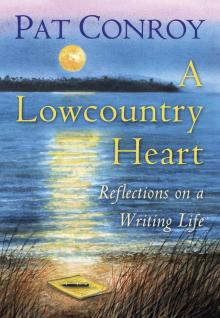 A Lowcountry Heart: Reflections on a Writing Life
A Lowcountry Heart: Reflections on a Writing Life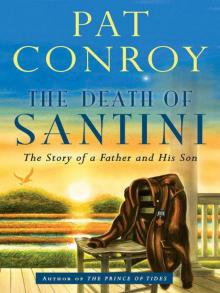 The Death of Santini: The Story of a Father and His Son
The Death of Santini: The Story of a Father and His Son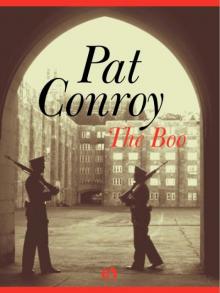 The Boo
The Boo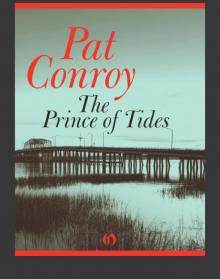 The Prince of Tides
The Prince of Tides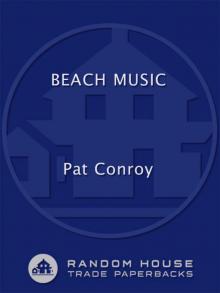 Beach Music
Beach Music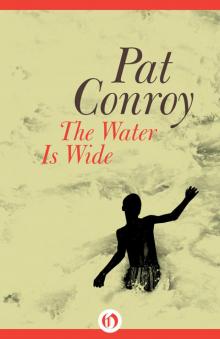 The Water Is Wide
The Water Is Wide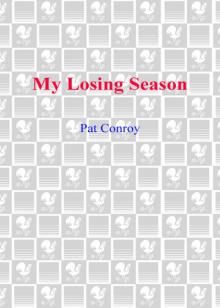 My Losing Season
My Losing Season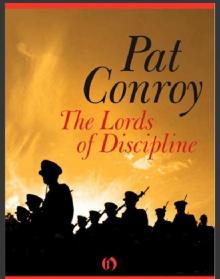 The Lords of Discipline
The Lords of Discipline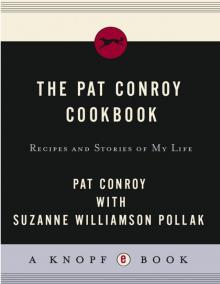 Pat Conroy Cookbook
Pat Conroy Cookbook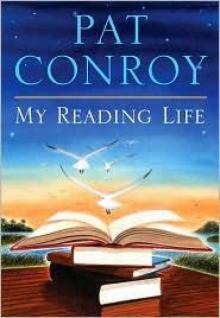 My Reading Life
My Reading Life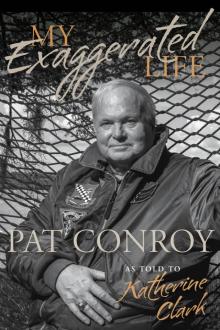 My Exaggerated Life
My Exaggerated Life The Pat Conroy Cookbook
The Pat Conroy Cookbook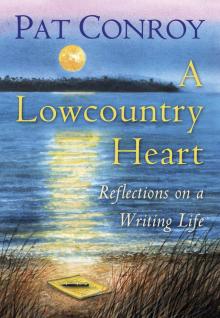 A Lowcountry Heart
A Lowcountry Heart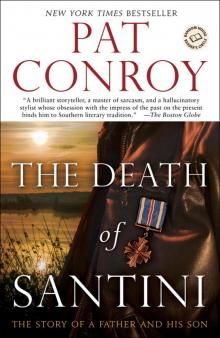 The Death of Santini
The Death of Santini